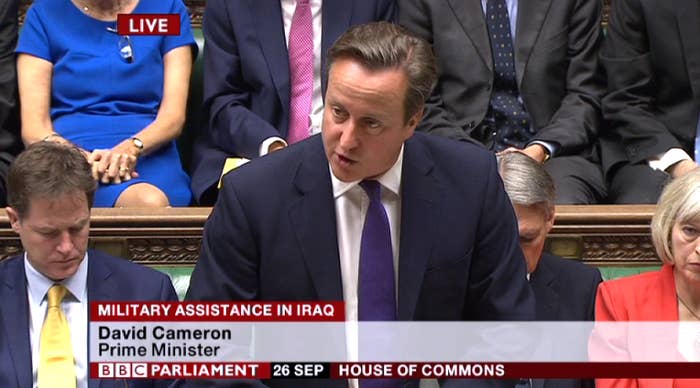
Updated — Sept. 26, 1:33 p.m. BST
Britain could launch military strikes against Iraq as early as tonight if the government wins a crucial vote in the House of Commons today, and prime minister David Cameron doesn't believe there is a legal barrier to extending the mission to Syria.
The government is expected to vote in favour of launching military action against "psychopathic, murderous, brutal" extremists – as Cameron described them to the UN yesterday – in Iraq, and there are suggestions that bombing could begin only hours after a vote.
MPs are currently debating the issue of launching air strikes in Iraq against the militant Islamic State of Iraq and Syria (ISIS) group in response to a request for assistance from Iraqi prime minister Haider al-Abadi.
The government had said the request for support means any action in Iraq would be legal under international law, but that strikes against ISIS in Syria would require another motion in the Commons. However, the prime minister today suggested the campaign could in fact be extended without the initial approval of parliament.
Cameron, the leader of the Conservatives, said: "Let me address very directly this issue of ISIL [i.e. ISIS] in Syria. I am very clear: ISIL needs to be destroyed in Syria as well as Iraq. We support the action that the US and five Arab states have taken in Syria.
"I don't believe there is a legal barrier, because I think the legal advice is clear that – were we to act or others to act – there is a legal basis. But it is true to say that the Syrian situation is more complicated than the Iraqi situation. It is more complicated because of the presence of the brutal dictator Assad, it is more complicated because of the state of the civil war."
The UK failed to support proposed air strikes against the regime of Bashar al-Assad in Syria last year after the opposition Labour party forced a rejection of a motion to approve the action in parliament.
Both Cameron and Labour leader Ed Miliband gave speeches in defence of today's motion in the Commons.
The prime minister said strikes were in Britain's national interest. "Is there a threat to the British people?" he said. "The answer is yes. ISIL [i.e., ISIS] has already murdered one British hostage and is threatening the lives of two more.
"The first ISIL-inspired terrorist acts in Europe have already taken place, with, for example, the attack on the Jewish museum in Brussels."
Miliband said he supported action in Iraq and that failure to act would make the situation in the country even worse, despite the already "catastophic consequences" of ISIS's advance. He added that the UK should back Iraq strikes in the spirit of the country's "tradition of internationalism".
He said air strikes should be part of a "comprehensive" humanitarian and political plan, and could not alone effectively counter the ISIS threat.
However, Miliband said it would be "better to seek a UN resolution" before launching action against ISIS in Syria.
Richard Otterway, the chair of the foreign affairs committee, said ISIS had managed to gain notoriety through their use of social media.
He said: "This intervention is different in two respects. For the first time war is fought using social media as a tool. The power of the internet is becoming increasingly apparent. We've all been shocked by their slick propaganda. For the most of us the first we heard of ISIL was on YouTube."
While British MPs were debating, Denmark's prime minister announced her country would join the US-led coalition against ISIS, sending seven F-16 fighter jets to conduct air strikes in Iraq.

